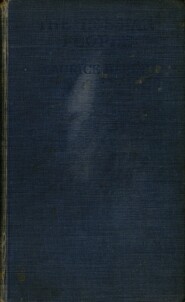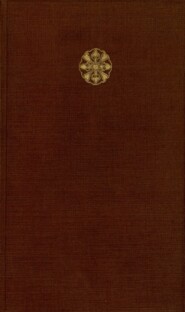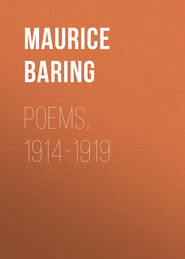По всем вопросам обращайтесь на: info@litportal.ru
(©) 2003-2024.
✖
Overlooked
Настройки чтения
Размер шрифта
Высота строк
Поля
"I would rather not have read it," she said. "It would make me uncomfortable when I talked to him. As it is, as the idiot who has read nothing newer than Ouida, I am quite comfortable."
I said he was writing something now which I thought would interest her. I told her how Rudd was making Miss Brandon the pivot of a story.
"Ah!" she said. "He told me he was writing something for his own pleasure. I will read that book."
I said he did not intend to publish it.
"He will publish it," she said. "It will be very interesting. I wonder what he will make of Jean Brandon. I know her well. I have known her for five years. They come here every year. They stay a long time. It is economical. She is a good girl. I like her. Elle me plaît."
I asked whether she was pretty.
The Princess said she was changeable —journalière, "Elle a souvent mauvaise mine." Not tall enough. A beautiful skin like ivory, but too pale. Eyes. Yes, she had eyes. Most remarkable eyes. You could not tell whether they were blue or grey. Graceful. Pretty hands. Badly dressed, but from poverty and economy more than from mauvais goût. A very English beauty. "You will probably tell me she is Scotch or Irish. I don't care. I don't mean Keapsake or Gainsborough, nor Burne-Jones, but English all the same. But I can't describe her. She has charm and it escapes one. She has beauty, but it doesn't fit into any of the categories.
"One feels there is a lamp inside her which has gone out, for the time being, at any rate. She reminds me of some lines of Victor Hugo:
"Et les plus sombres d'entre nous
Ont eu leur aube éblouissante."
"I can imagine her having been quite dazzling when she was a young girl. I can imagine her still being dazzling now if someone were to light the lamp. It could be lit, I know. Once, two years ago, at the races here at Bavigny, I saw her excited. She wanted a friend to win a steeplechase and he won. She was transfigured. At that moment I thought I had seldom seen anyone more éblouissante. Her face shone as though it had been transparent."
Of course the poor girl was unhappy, and why was she unhappy? The reason was a simple one, she was poor, and Mrs. Lennox economized and used her as an economy.
"You see that the poor girl is obliged to make de petites économies in her clothes. She suffers from it I'm sure. Who wouldn't? This all comes from your silly system of marriage in England. You let two totally inexperienced beings with nothing to help them settle the question on which the whole of their lives is to depend. You let a girl marry her first love. It is too absurd. It never lasts. I do not say that marriages in our country do not often turn out very badly. No one knows that better than I do, Heaven knows; but I say that at least we give the poor children a chance. We at least do not build marriages on a foundation which we know to be unsound beforehand, or not there at all. We do not let two people marry when we know that the circumstances cannot help leading to disaster."
I said I did not think there was much to choose between the two systems. In France the young people had the chance of making a satisfactory marriage; in our country the young people had the chance of marrying whom they chose, of making the right choice. It was sometimes successful. Besides, when there were real obstacles the marriages did not as a rule come off. Mrs. Lennox had told me that Miss Brandon had been engaged when she was nineteen to a man in the army. He was too poor. The engagement had been broken off. The man had left the army and gone to the colonies, and there the matter had remained. I didn't think she would have been happier if she had been married off to a parti.
"She would not have been poor," said Princess Kouragine. "And she would have been more independent. She would have had a home."
She said she did not attach an enormous importance to riches, but she did attach great importance to real poverty, especially to poverty in the class of people with whom Miss Brandon lived. She said the worst kind of poverty was to live with people richer than yourself. It was a continual strain, she knew it from experience. She had been through it herself soon after she was married, after the first time her husband had been ruined. And nobody who had not been through it knew what it meant, the constant daily fret.
"The little subterfuges. Having to think of every cab and every box of cigarettes. Not that I thought of those," she said. "But it was clothes which were the trouble. I can see that that poor Jean suffers in the same way. And then, what a life! To spend all one's time with that Mrs. Lennox, who is as hard as a stone and ruthlessly selfish. She does not want Jean to marry. Jean is too useful to her."
I said I wondered why she had not married. Surely lots of men must have wanted to marry her.
Princess Kouragine said that Mrs. Lennox was quite capable of preventing it. She rarely took her out in London. She brought her to Haréville when the London season began and they stayed here two months. It was cheaper. In the winter they went to Florence or Nice.
I said I wondered whether she was still faithful to the man she had been engaged to, and what he was like.
Princess Kouragine said she did not know him. She had never seen him, but she had heard he was charming, très bien, but he hadn't a penny. It appeared, however, that he had a relation, possibly an uncle, who was well off, and who would probably leave him money. But he was not an old man and might live for years.
I said that perhaps Miss Brandon was waiting for him.
"Perhaps," said Princess Kouragine, "but she was only nineteen when they were engaged, and he has been away for the last five years. People change. She is no longer now what she was then, nor he, probably."
She did not think this episode was a real obstacle; she was convinced Miss Brandon did not feel bound, but she thought she had not yet met anyone whom she felt she would like to marry. Nor was it likely for her to do so considering the milieu in which she lived, in which she was obliged to live.
Mrs. Lennox liked the continental, international world. The world in which everyone spoke English and hardly anyone was English. It was not even the best side of the continental world she liked. She did not mean it was the shady side, not the world of adventurers and gamblers, but the world of international "culture." All the intellectual snobs were drawn instinctively to Mrs. Lennox. People who discovered new musicians, new novelists, and new painters, who suddenly pronounced as a dogma that Beethoven couldn't compose and that the old masters did not know how to draw, and that there was a new music, a new science, and, above all, a new religion.
"She is always surrounded just by those one or two men and women 'qui rendent l'Europe insupportable et qui la gobent,' they swallow everything in her, her views on art, her dyed hair, and her ridiculous hats. Is it likely that Miss Brandon, the daughter of an old general, brought up in the Highlands of Scotland, and passionately fond of outdoor life, would find a husband among people who were discussing all day long whether Wagner was not better as a writer than a musician? She never complains of it, poor child, but I know quite well that she is écoeurée. She has had five years of it. Her father died five years ago. Till he died she used to look after him and that was probably not an easy life, either, as I believe he was a very exacting old man. Her mother had died years before, and she had no brothers and no sisters. No relations who were friends, and few women friends. She is alone in a world she hates."
I said I wondered that she had not left it. Girls often struck out a line for themselves now and found occupations.
Princess Kouragine said that Miss Brandon was not that sort of girl. She was shy and apathetic as far as that kind of thing was concerned, apathetic now about everything. She had just given in. What else could she do? Where could she live? She had not a penny.
"You see if a sensible marriage had been arranged for her, all this would not have happened. She would have now had a home and children."
I said that perhaps she was being faithful to the young man.
Princess Kouragine said I could take it from her that she had never loved, "elle n'a jamais aimé" She had never had a grande passion.
I asked the Princess whether she thought her capable of such a thing. She seemed so quiet.
"You have never seen the lamp lit," said the Princess, "but I have; only for one moment, it is true, but I shall never forget it."
She wondered what Rudd would make of the character. He hardly knew her. Did he seem to understand her?
I said I thought he spun people out of his own inner consciousness. A face gave him an idea and he made his own character, but he thought he was being very analytical, and that all he created was based on observation.
"He certainly observes nothing," said the Princess.
She asked who would be the hero. I said we had not got as far as the hero when he had discussed it with me.
"And what will he call the novel?" she asked.
Ah, that was just the question. He had discussed that at length. He had not found a title that satisfied him. He had got so far as "The Princess without any Dreams."
"Dieu qu'il est bête," she said. "Cette enfant ne fait que rêver."
She told me I must get Rudd to discuss it with me again.
"Perhaps he will talk to me about it, too. I will make him do so, in fact. It will not be difficult. Then we will compare notes. It will be most amusing. The Princess without any dreams, indeed! He might just as well call her the Princess without any eyes!"
CHAPTER III
This afternoon I was sitting on a bench in the most secluded part of the park when I heard someone approach, and Miss Brandon asked if she might sit down near me and talk a little. Mrs. Lennox had gone for a motor drive with Mr. Rudd.
"He is our new friend," she explained. "That is to say, more Aunt Netty's friend than mine."
I asked her whether she liked him.
"Yes, but he doesn't take much notice of me. He asks me questions, but never waits for the answer. I feel he has made up his mind about me, that I am labelled and pigeon-holed. He loves Aunt Netty."
I asked what they talked about.
"Books," she said.
"His books, I suppose," I said.











